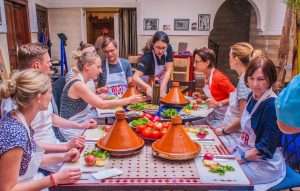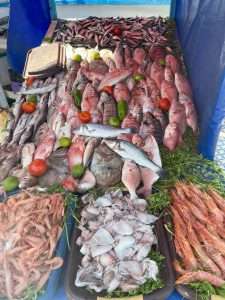Attending a cooking class in Morocco can be an enriching and delightful experience; As Moroccan cuisine is known for its vibrant flavors and aromatic spices. Here’s a general outline of what you might expect from a typical cooking class in Morocco:


Introduction to Moroccan Cuisine:
Your cooking instructor will likely begin by introducing you to the basics of Moroccan cuisine; including the key ingredients and spices used in traditional dishes.
Market Tour (Optional):
Some cooking classes may start with a guided tour of a local market; Where you can learn about the fresh produce, spices; And other ingredients commonly used in Moroccan cooking. This can provide valuable insights into the ingredients you’ll be working with.
Menu Selection:
You may have the opportunity to choose the dishes you want to learn to cook from a selection provided by the instructor. Popular choices might include tagines (slow-cooked stews), couscous, pastilla (a savory pastry), or Moroccan salads.
Preparation and Cooking:
Under the guidance of your instructor, you’ll learn how to prepare the selected dishes from scratch. This typically involves chopping vegetables, mixing spices, marinating meats, and following traditional cooking techniques.
Hands-On Experience:
Cooking classes in Morocco often emphasize hands-on participation, allowing you to actively engage in the cooking process rather than just observing. You’ll likely have the chance to work with traditional Moroccan cooking utensils such as tagine pots and couscoussiers.
Cooking Techniques and Tips:
Throughout the class, your instructor will share valuable cooking techniques and tips specific to Moroccan cuisine. This may include advice on how to layer flavors, balance spices, and achieve the perfect texture in your dishes.
Tasting and Enjoying:
Once the cooking is complete, you’ll have the opportunity to sit down and enjoy the fruits of your labor. This is a chance to savor the flavors of authentic Moroccan cuisine and appreciate the dishes you’ve learned to prepare.
Recipe Cards or Booklets:
Many cooking classes provide recipe cards or booklets for participants to take home, allowing you to recreate the dishes you’ve learned in your own kitchen.
Cultural Insights:
In addition to learning about cooking techniques and recipes. Cooking classes in Morocco often provide insights into the cultural significance of food in Moroccan society. You may learn about the role of food in Moroccan celebrations, traditions, and daily life.
Overall, attending a cooking class in Morocco is not only a delicious and educational experience but also a wonderful way to immerse yourself in the rich culinary heritage of this vibrant North African country.
 +212 675-908530
+212 675-908530